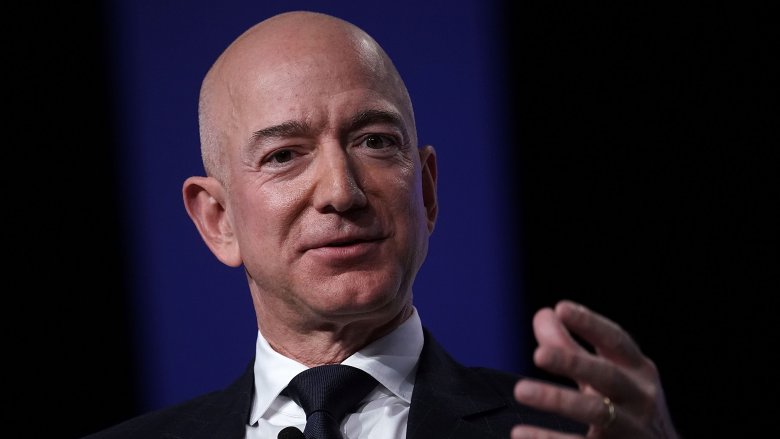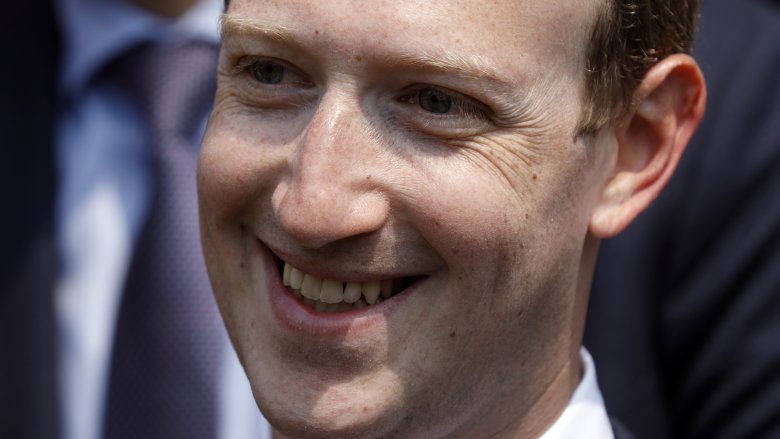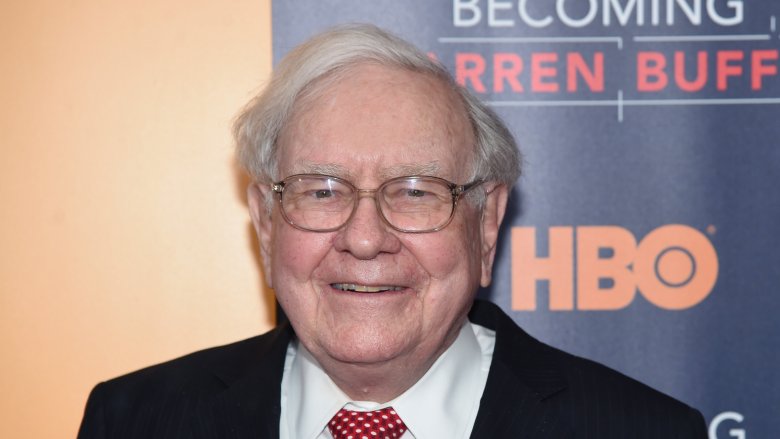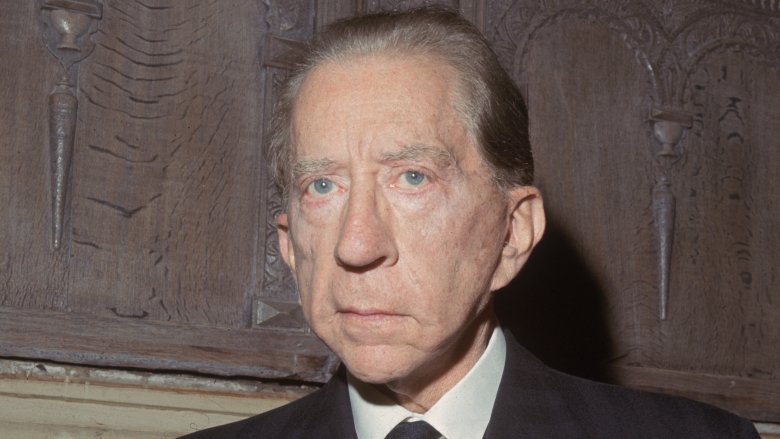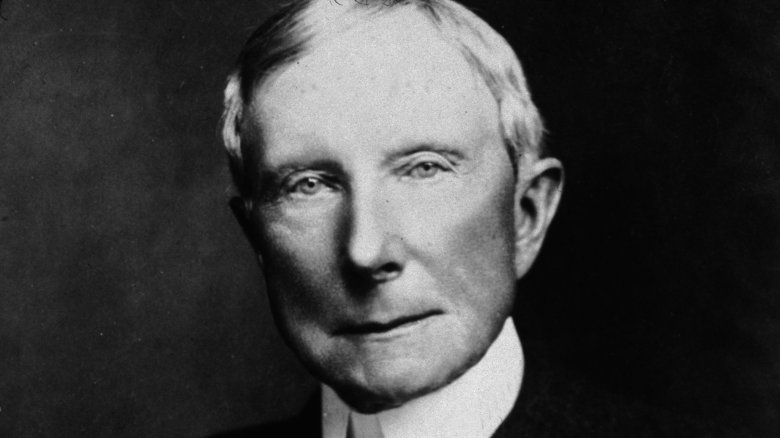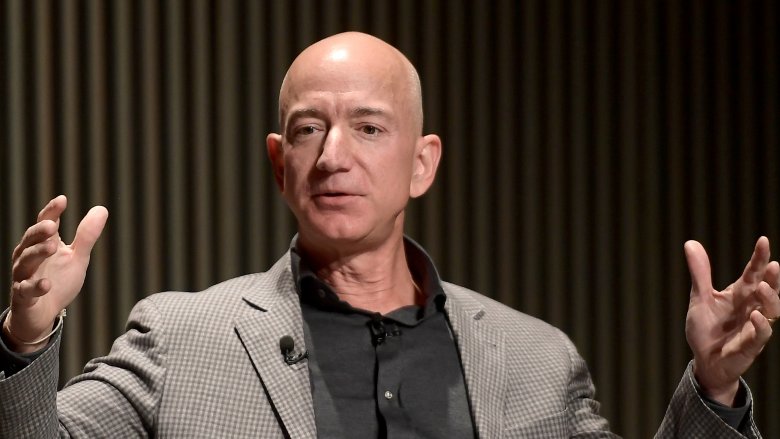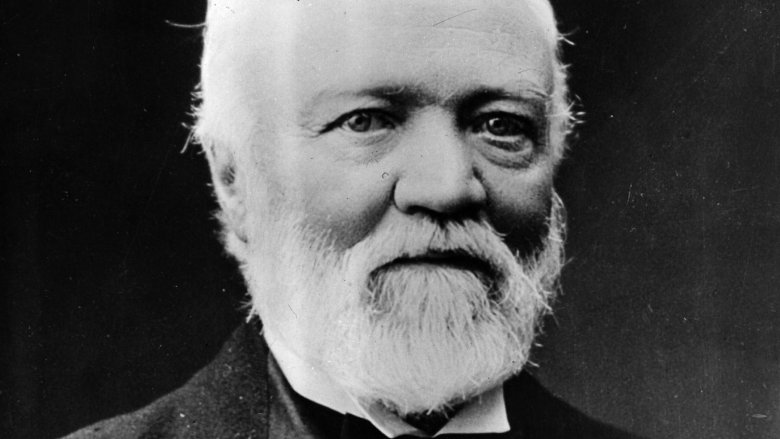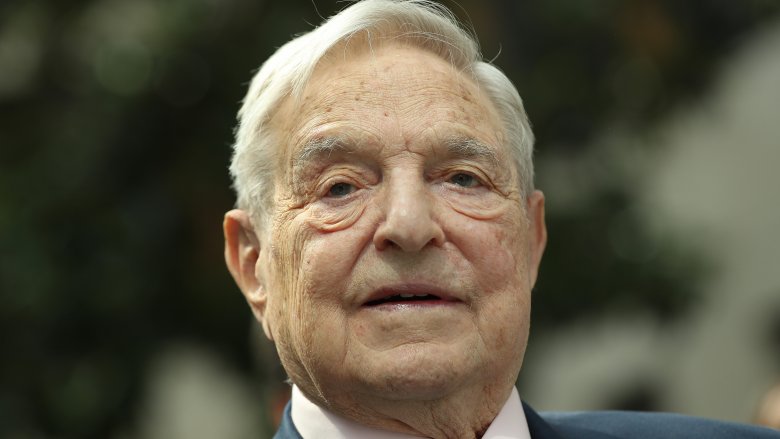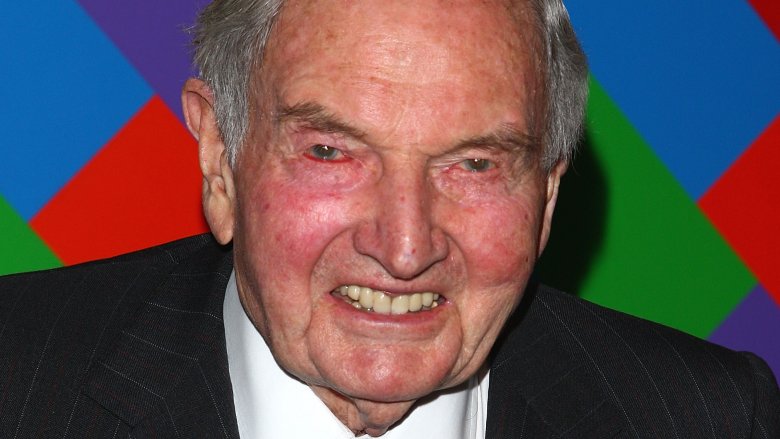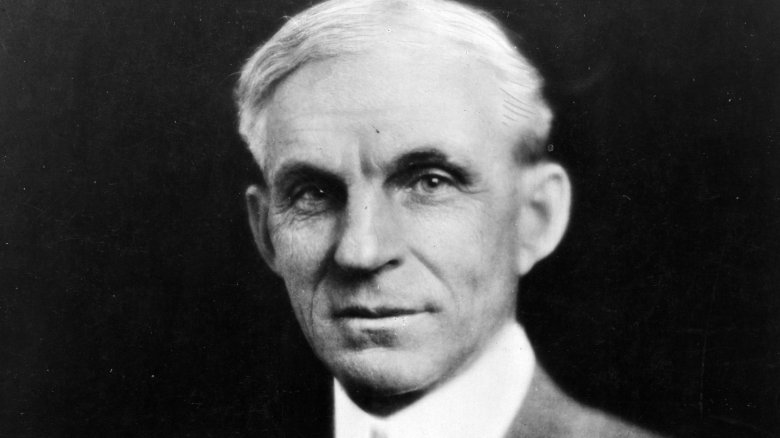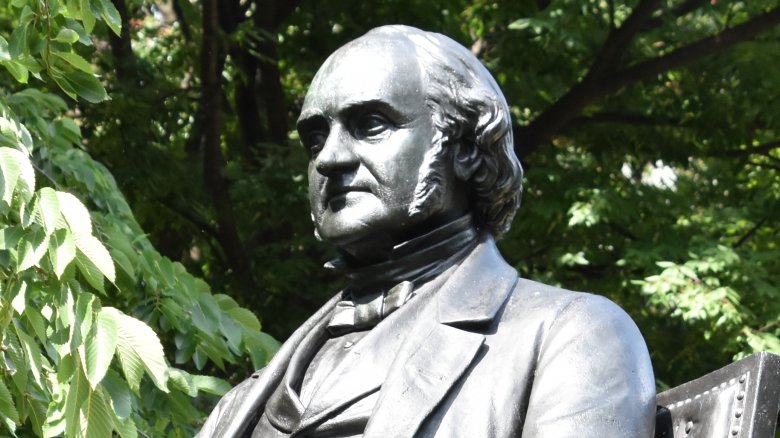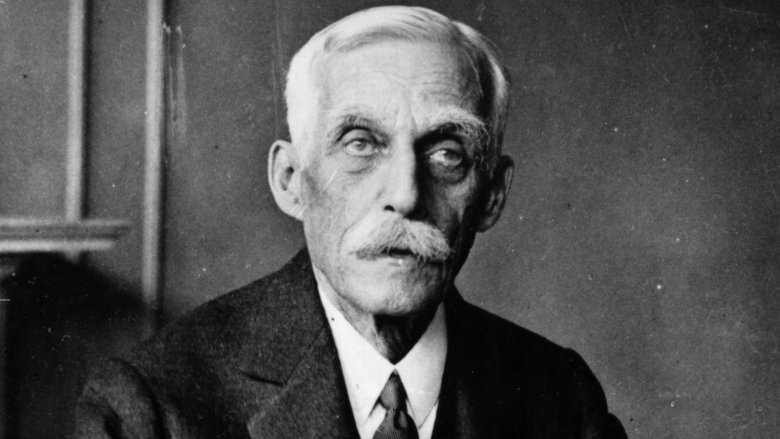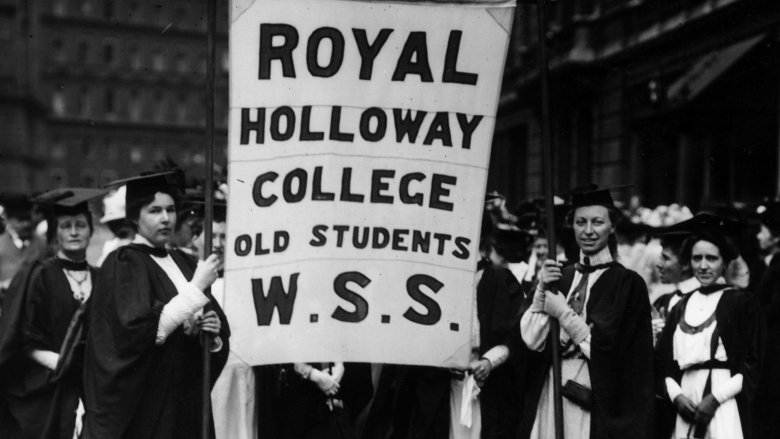Respected Philanthropists Who Are Actually Terrible People
Being a philanthropist is like shorthand for saying "I'm a good person." Here you are, stinking rich and giving away vast sums of money to the poor and needy. And it's not like philanthropy doesn't work. The Bill and Melinda Gates Foundation is credited with saving 122 million lives worldwide (via the Guardian), Jimmy Carter's Carter Center has almost eradicated guinea worm (via the UN), and Mark Zuckerberg once boosted Newark schools' English levels with a $100 million gift (via USA Today). If only every rich person were noble enough to get into philanthropy, huh?
Well, here's the thing, being a philanthropist is less of a marker of decency than you'd like to think. For every genuine do-gooder like Bill Gates, you have plenty of shysters, schemers, egomaniacs, misers, and businessmen so shady you could use them as a sunblock. The act of philanthropy itself may be good. The people doing that giving? Not so much.
Mark Zuckerberg: Violating your privacy since day one
In 2015, Mark Zuckerberg and his wife, Priscilla Chan, announced they were going to donate 99 percent of their fortune to charity (via Verge). While that would still leave them richer than 99 percent of the rest of humanity, it was a jaw-dropping gift. It also wasn't the only jaw-dropping thing Zuckerberg has ever done. Nah, that'd be violating people's privacy like he's auditioning for the Stasi.
In 2010, Business Insider dropped the bombshell story that Zuckerberg had apparently used Facebook to get inside people's private lives while at Harvard. Back in 2004, journalists at the Harvard Crimson were preparing to run a negative story on Zuckerberg. Desperate to get ahead of the criticism, Zuckerberg reportedly checked for failed Facebook logins by the two journalists — hoping to find if they had ever accidentally input a password they usually used elsewhere. He then harvested these incorrect passwords and used them to secretly access the journalists' emails.
That's shady stuff, and while it was a long time ago, it fits in with a pattern of behavior. Between 2010 and 2015, Zuckerberg championed something on Facebook called Open Graph. It gave advertisers nearly unlimited access to your most private data, even if you didn't consent to it. Open Graph was so invasive that Wired has since called it "the smoking gun" at the heart of Facebook's privacy scandals.
Warren Buffett: Monopoly in real life
Warren Buffett, the "sage from Omaha," is a famously frugal dude. He still lives in his same middle-class house and eats the same basic meals as he ever did. The one area where he does show largesse is philanthropy. From 2006 onward, Buffett joined Bill Gates in a pledge to give away 99 percent of his wealth to charity. But that doesn't necessarily mean Buffett is great for the world. As the Nation has reported, Buffett got all that money by investing in and helping sustain monopolies.
Monopolies can be extremely Not Good for everyone. It was the monopoly on financial ratings held by companies like Moody's that helped cause the 2008 crash, for example. One of Moody's biggest pre-2008 investors, by the way? Warren Buffett.
Buffett's whole modus operandi is to invest in a company that is a near-monopoly and then focus all his energies into making sure no other companies can compete. He calls this widening the moat, and it means huge profits for him, but also hugely anti-competitive, inferior products for everyone else. Unfortunately, Buffett is also teaching his many acolytes to invest in the exact same way. It's great if you're a Berkshire Hathaway stockholder. It's less great if you want to live in a world where capitalism actually functions.
John Paul Getty: Miserly to the point of insanity
At one point in time, the answer to the trivia question "who is the richest man in the world?" was John Paul Getty. During the 1970s, the oil tycoon was making enough each day to buy and sell most other wealthy folks a dozen times over. He was also fabulously free with his money (via the Guardian). He gave Britain's National Gallery millions, once donated a mansion to children in need, and even paid for people to rescue a family of seals trapped in a storm.
But there was one group of people Getty refused to give even a dime to. When it came to his family, Getty was the biggest miser around. This Scrooge-ish streak reached its apex when his grandson, John Paul Getty III, was kidnapped by Italian gangsters and held for ransom.
You may know the vague outlines of the story, including the way Getty refused to pay the $17 million demand. You may not know just how crazy his refusals were. It wasn't until his grandson's ear was sliced off that Getty ponied up any cash, and then only $2.2 million. Why such a specific amount? Because that's the amount that he could write off as a tax deduction. It's bad enough if you stop there, but Getty offered another $1 million for his own son to put toward the ransom ... as a loan with a 4% annual interest rate. In Getty's world, grandkids took a backseat to the needs of random seals.
John D Rockefeller: Funding Nazi doctors
John D. Rockefeller is chiefly remembered for two things today: being stinking rich, and giving a lot of that smelly wealth to charity. What he isn't remembered for is the raging passion he had for eugenics. According to the Guardian, during the 1930s, the Rockefeller Foundation poured money into race and eugenics institutes in Nazi Germany, including funding high-ranking Nazi doctors.
One of the highest ranking was Otmar von Verschuer, also known as the guy who trained Josef Mengele, the Auschwitz Angel of Death. While von Verschuer was not involved in the Holocaust, the United States Holocaust Memorial Museum notes that he was still a cheerful advocate for forced sterilization of undesirables and anyone else Hitler had decided to dump on. This was a position the good doctor had held since 1927, so, y'know, maybe someone should have checked before giving him all those Rockefeller dollars.
Then again, maybe they did check and simply liked what they saw. History News Network reports that Rockefeller's cash directly helped turn the German eugenics program from a couple of guys in a stuffy lab into a sprawling Nazi organization that would eventually murder millions. Eugenics, kids. It's a bad idea.
Jeff Bezos: Corporate brutality
In February 2019, Amazon owner Jeff Bezos hit an impressive target. The Chronicle of Philanthropy awarded him its number one giving spot. Over 2018, Bezos and his then-wife gave over $1 billion more to charity than anyone else. That's great, until you remember all that money comes from Amazon. Amazon makes its money by cutting pay and having its employees work in conditions so Victorian even Queen Victoria would be appalled.
Time in Amazon's warehouses is managed down to the second. A Guardian report found an "emotionally toxic culture" where people are treated like things; where sexism, ageism, and racism are rife; and where stress-inducing mind games are just part of the grind. "Well," you might be thinking, "that's just the ground floor, how much control does Bezos have over that?" Um ... a ton of control. This corporate model continues all the way to the top. In 2015, the New York Times examined conditions for Amazon's white collar workers and found a culture of quiet desperation where sabotaging and backstabbing others was constantly encouraged.
Bezos' vision for Amazon's workforce is like he read The Hunger Games and thought, "Hey, that's a great way to run an office!" The Times reported on employees being culled because cancer or pregnancy had made them less productive. When your corporate culture values productivity over not dying of cancer, you know you've made a mistake somewhere.
Andrew Carnegie: Horrendous working conditions and employee deaths
Even if Andrew Carnegie lived today, his wealth would be mind-numbing. The most common figure thrown around for his net worth in today's dollars is around $310 billion. That's about double what Jeff Bezos is worth, although Bezos is living in very different times. How different? Well, for all of Bezos' control-freakiness, even the worst Amazon warehouse can't compare to Andrew Carnegie's Victorian steel mills. According to the Economist, workplace accidents at Carnegie's mills once accounted for 20% of all male adult deaths in Pittsburgh.
Carnegie wasn't just slack with workplace safety, but his employees' family lives, too. The "father of philanthropy" once closed a plant just ten days before Christmas after discovering a rival had beat him in wage cuts. Around 1,600 employees were laid off until they were so cold, so sick, so starving that they agreed to come back and work for 33% less (via the Scotsman). If the Ghost of Christmas Past didn't visit Carnegie that year, it's only because Carnegie had bought up the spirit world and laid him off to drive down costs.
We haven't even touched on the strikebreakers yet. Carnegie was super involved with the response to the 1892 Homestead Strike, when hired goons were sent in to brutalize the strikers and 12 people got killed.
George Soros: Monetary crises for personal profit
Before he became famous as the bogeyman for every conspiracy theorist on the internet, Hungarian-born billionaire George Soros was mostly famous for giving away his money. Unless, that is, you happened to be a former finance minister. During the 1990s, Soros made big bucks betting against currencies across the globe. While his methods were legal, they still triggered currency crises in multiple nations, wiping out savings and generally screwing over anyone with less money than Soros (i.e., everyone).
It started in 1992, when Soros bet heavy against the British pound, leading to something called Black Wednesday, when £3.3 billion in value was wiped from the Bank of England, according to the Times of London. But this was just the warm-up act. In 1997, Soros turned these same tactics toward a host of Asian currencies, resulting in a sweeping financial crisis that consumed the region (via Business Insider).
To be fair, Soros wasn't the only factor in the crises. The various currencies he attacked were overvalued, and better government policies could have avoided financial Armageddons. To be fair to his victims, his speculation still resulted in him becoming filthy rich while millions were cast into poverty. The saying goes "don't hate the player, hate the game." The obvious answer is "Can't we hate both?"
David Rockefeller: Cozying up to a mass murderer
The entire Rockefeller family is known for its giving, and David Rockefeller is no different. Following his March 2017 death, it was reported the value of the endowment he'd left to his foundation had ballooned past the quarter of a billion mark (via Chronicle of Philanthropy). One of the key things Rockefeller's money goes toward is criminal justice, which is ironic, given that he once cozied up to one of the biggest criminals in history. According to journalist John Pilger, Rockefeller was intimately involved in a corporate rush into Indonesia just as its ruler Suharto was undertaking genocide.
Suharto was the kind of guy everyone should have refused to do business with. A far right autocrat, he began his military dictatorship with the mass murder of up to a million suspected Communists (via the Guardian). Not content with stopping there, he then launched an invasion of East Timor that also constituted a genocide. It's not many dictators who get to indulge in two large-scale killings over their reign.
So where does Rockefeller fit into this? Well, because of Suharto's anti-Communist streak, there was a rush from Western governments to support him. In the USA, that meant flooding Indonesia's economy with money from American corporations. In 1967, Pilger documents a craven rush of capitalists toward this blood-soaked tyrant, with David Rockefeller acting as ringleader. The millions of Indonesians dying were simply ignored.
Henry Ford: Hanging out with Hitler
Henry Ford was both a generous giver, and a deeply strange one. Philanthropy sites estimate that he gave away 33% of his income, usually handing it out personally to people. On the other hand, he despised organized charity and thought giving to the poor would make them lazy. Ford admired men who went out and did what they wanted, using every ounce of their strength to claw their way to the top. That may go some way toward explaining why he admired one particular man so much. During the 1930s, Henry Ford was friends with Adolf Hitler.
It probably helped that Ford was deeply anti-Semitic. He believed a shadowy cabal of Jews controlled the world, and he published newspaper articles saying so. Hitler praised Ford in Mein Kampf and kept a large picture of the American in his office. It seems Ford was happy to return the favor. As late as July 1938, he was traveling to Germany to receive a Nazi award.
By mid-1938, no one had any doubt about Nazi intentions. This was after the book burnings, after the Night of the Long Knives, and after the annexation of Austria. Kristallnacht was only months away, and it wasn't like there weren't warning signs. Jewish citizens had already lost their right to vote, had been banned from public places, and had been kicked out of universities (via British Library). Yet there Henry Ford was still photographed, grinning away as he was given his Nazi award.
George Peabody: Public giver, private miser
George Peabody is basically the guy who invented philanthropy. A mega-wealthy American financier who worked in Britain, he gave away so much money to so many causes it's hard to keep track of them all. He founded museums in America, gave financial support to freed slaves in the Deep South, built houses for London's poverty-stricken ... you name it, if it helped the world and it happened in the mid-19th century, it probably had George Peabody's name on it.
But when it came to his own life, Peabody wasn't quite so generous. According to the South China Morning Post, Peabody was so miserly that he regarded even the smallest pleasure as the most outrageous excess.
Despite being worth $20 million, Peabody refused to buy his own carriage, preferring instead to travel by public transport. While this may sound like keeping it real, the real motives were keeping it cheap. At the time, London had a two-penny bus service for regular working folk and a penny bus service for the seriously destitute. Peabody always rode the latter, even if it meant standing in the pouring rain until he got sick while perfectly good two-penny buses whisked past. The single indulgence he allowed himself was to spend one pence and a halfpenny on an apple each day. Talk about living large.
Andrew Mellon: Borderline hilarious callousness
Andrew Mellon was once known as the man who made the Twenties roar. The U.S. Treasury Secretary for much of the 1920s, Mellon was both seriously loaded and seriously cool with offloading his loot onto charitable causes. Unfortunately, his position as treasury secretary also meant he oversaw a little something called the Wall Street Crash, aka the financial apocalypse that ruined millions and led to the Great Depression.
Now, the causes of the Wall Street Crash were complex, and you can't really pin the blame for all of it on Mellon. What you can blame him for is his crazy callousness in the aftermath of all that money falling down to Earth. According to Herbert Hoover, Mellon responded to the catastrophe he'd helped oversee by telling the president to "liquidate labor, liquidate stocks, liquidate the farmers, liquidate real estate." Whoa.
While Mellon's economic shock therapy never really got off the ground, he was extremely laid back about the crash that was ruining lives around the world. According to the Telegraph, Mellon's take on the worst slump in modern history was to effectively shrug and say "People will work harder, live a moral life. Values will be adjusted, and enterprising people will pick up the wrecks from less competent people." Thankfully those same "less competent" people were able to vote, and Mellon was ejected from office alongside his boss in 1932.
Thomas Holloway: Charity funded by fake medicine
Victorian philanthropist Thomas Holloway was so well regarded in his native Britain that his name is still attached to famous London institutions, like Royal Holloway College. Over his lifetime, Holloway amassed a fortune selling medicine before selflessly giving his money back to the people he'd already helped so much. Medicine and giving to charity? What a savior.
There was just one problem with Holloway's selling medicine to the masses. He wasn't a licensed doctor or a licensed pharmacist. In fact, he wasn't a licensed anything. The pills Holloway made his fortune on had no medicinal properties whatsoever. According to the BBC, scientists tested a host of Holloway products after the philanthropist had died. They reported "few of his products contained any ingredients considered of significant medicinal value."
Of all the fake things to sell people, fake medicine has to rank somewhere near the top of the awful scale, maybe below fake dialysis machines but well above fake aliens, fake Bigfoot pictures, and pretty much most other types of fakes. But hey, apparently if you do it often enough, you can still get your name on a respected college.
